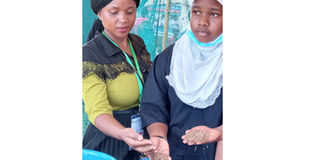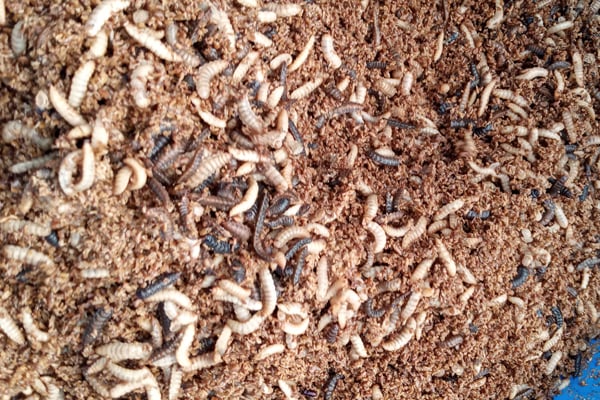Prime
Student joins business of breeding black soldier flies

Rhemmy Shamim (R) explains how to trap the black flies. Photo / Lominda Afedraru
What you need to know:
- The protein from insects is natural and has no chemicals. It has no side effects. It is also easily available and can be produced in large quantities and cheaply.
It is early morning and Seeds of Gold team sets off for a journey to the source of the Nile for a fact finding activity at the agricultural show organised for students across the country.
As one approaches the show ground, there is a scenery of influx of students with their teachers all over.
They are so organised and in the mood of learning as they gather in small groups in various stalls listening to experts who are sensitising them about various agricultural activities ranging from research on crops, animals, poultry, mechanical agriculture, value addition and other innovations using agricultural commodities.
Black soldier fly rearing
On the outskirts of Kampala in Kyengera Town, Seeds of Gold team visited the densely populated suburb in search of a student farmer Rhemmy Shamim. Shamim is a Senior One student at Crane High School Entebbe Campus. She is emptying kitchen waste into a pen when we arrive at her parents beautiful home. A short distance from the house, standing near the fence, is a structure made of timber, iron sheet on the roof and polythene sheet on the walls. “This is my farm,” says Shamim. “It is where I have invested all my energies and my dreams.” Shamim was introduced at the school two years ago and when she joined the school in January 2022, she picked interest in it.
At school, the black soldier flies were initially obtained from the wild. They were kept in a confined caged condition where they have managed to reproduce in large numbers.
Since the purpose of rearing the insects is to collect maggots on large scale, Shamim and other students ensure they prepare a card board paper for the insects to lay eggs. These are then collected and kept in containers mixed with any mashed food made of maize brand mixed with silver fish powder.
It will take 45 days for them to grow to a stage which can be fed to fish after it is dried and mashed. The same can be fed to chicken or fed inform of fresh maggots.
Rich in protein
Maggots obtained from black soldier fly are rich in protein estimated at the ratio of 80 percent and so if fed to fish and chicken, it enables them to grow faster.
Since Shamim learnt the technique of rearing black soldier flies, she has since established her own farm at her parents’ home in Nakabonge Village in Kyengera.
She established her farm during first term holidays and her first sell of fresh maggots to farmers rearing chicken around the village earned her Shs300,000.
At the moment she is able to earn Shs500,000 or more from maggot sales because she sells both fresh and processed dry ones. Shamim has set up the rearing facility in a 300 square metre piece of land which is enclosed with nets and a permanent roof top. The place is divided into chambers comprising of the egg laying chamber and maggot development chamber.
She is able to harvest two kilogrammes of maggots on daily basis. She sells each kilogramme at Shs10,000.
Odourless
“We all generate a lot of waste every day in our kitchens but for me, I do not dump it. I use it to feed my insects,” says Shamim.
The flies feed on any food remains from their kitchen. “They like fruits waste compared to food remains such as potato peelings. They like them moist and fresh. I collect the kitchen waste for three days and put in their house,” she says.
A single black soldier fly hatches between 300 and 600 eggs at once, according to Shamim, noting that they multiply faster. When the fly is ready to lay eggs, she covers the structure with a carton so that she can lay eggs in dark areas. The eggs are usually a white and brown in colour.
She then incubates them for about 10 days, depending on the environmental temperatures, before she transfers them to another section they can start feeding. “Incubation refers to placing the eggs in a conducive environment to hatch. For me I use dry cartons to create the environment,” she says.
The metamorphosis process starts from the eggs that turn into larvae after three to four weeks as they feed. Later, they turn into pre-pupae where they stop feeding and act dead as they progress to pupae.
Reduce cost of animal feeds
The insects are dried under the sun or inside an oven. Poultry and fish farmers will cut the costs by up to 50 percent through the technology. Robert Jaawa, an agriculture teacher says it is of importance that farmers adopt the new technology to reduce cost of animal feeds and increase their productivity. “The insects are normally found at compound heaps making it easy to harvest them for use as foods for animals. But before feeding to the animals, they should be sterilised by burning them in an oven, exposing them to direct sunlight or freezing. That helps in killing a percentage of the germs,” he says. Shamim who is currently bulking the insects, says her plan is to use them to process animal feeds for sale.
“My long-term goal is be able to formulate my own feeds,” she says. “This is a scale that needs huge production of black soldier flies and it is what I am working on.”
KEY FACT
A single fly hatches between 300 and 600 eggs at once. A gramme of the eggs produces 2.4 kilogrammes of larvae with 42 percent protein, 35 percent fat and other minerals that include calcium, vitamins and amino acids.




